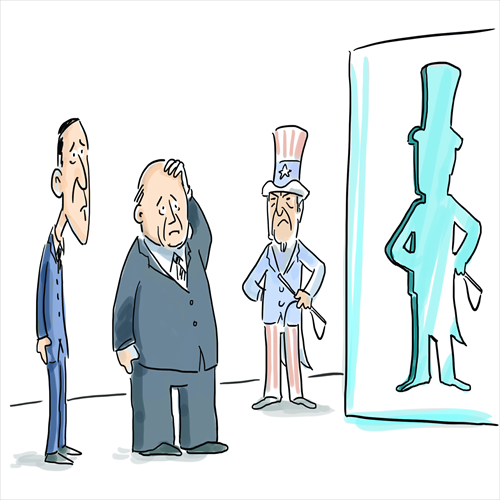Mutual recognition helps bridge civilizations

Illustration: Liu Rui/GT
Donald Trump has been far from friendly to China, repeatedly criticizing the world's second largest economy for engaging in "unfair and unlawful practice" of tariff imposition and currency manipulation. Then, why did some Chinese commentators and citizens express their fondness for the politically incorrect candidate over Hillary Clinton in the US presidential election?
To some Chinese, Trump's rise testified to the internal decay of the US's liberal democratic system and the virtual rebellion of the working class against the establishment. Others forecast that the Sino-US relations could become more business-like, because Trump, as a businessman, knows how to make deals and reach a compromise.
In this sense, he appears more acceptable than the Democratic front-runner who often raised such issues as human rights in a show of the hypocrisy and biases of the West against the rest of the world.
As indicated in the Chinese acceptance of the Republican candidate, the Chinese state and people prefer the isolationist and pragmatic Republican policy lines to the interventionist Democratic ones. To better understand this puzzle, it is important to look at the Chinese people's worldview and self-identities and how these could interact with the competing ideas and ideologies held by the US and the rest of the world.
First, we need to think about whether China is a nation state or a civilization. Even before the birth of the Westphalian nation state in the 17th Century, history records the countless rises and falls of states and empires in China during several millennia.
Even after many Chinese empires had been defeated and occupied by such non-Chinese outsiders as Mongols and Manchus, the Chinese civilization survived miraculously by integrating the invaders and eventually sinicizing them.
In this way, Zhang Weiwei's depiction of China as a "civilizational state" is just a play on words, because it is impossible to confine China in the straitjacket of a nation state in spite of the qualifier, "civilizational."
Therefore, the current inter-civilizational misunderstanding stems largely from the fact that the outside world, particularly the US, did not give due recognition to the Chinese worldview and self-identities and treated China as one of the non-Western states or targets for democratization and liberalization.
The civilizational values and the founding principles of the US have greatly contributed to the world and it is natural for it to propagate them across the world. However, the way it has exercised its power has been problematic and offended the self-esteem of other civilizations.
Without consulting Western intellectuals, such as Prussian general and military theorist Carl von Clausewitz, Sun Tzu, the author of the Art of War, achieved the mastery of war strategies and tactics and even elevated his works to the level of philosophy. It is ridiculous to judge whose philosophy reached a higher level between Confucius and Plato or Kant or Hegel.
One of the timeless teachings of Confucius has been that it is never a waste of time to nurture the desire to learn from one another and pursue a harmony between them. In the same vein, Clausewitz analyzed war from his theory of a floating balance among emotion, reason and probabilities and argued that achieving peace is the goal of war rather than the total destruction of the enemy.
In a nutshell, a proper recognition of the others, rather than a condescending demeanor, is a shortcut to ending the current disputes between "we and the rest." No matter how great or powerful any single state or civilization might become, the "rest" will be always bigger and more populous than it.
Andreas Herberg-Rothe is a renowned Clausewitz scholar and senior lecturer at the faculty of social and cultural studies, University of Applied Sciences, Fulda, Germany. Miriam Förstle is his assistant in the research project "Western and Non-Western conceptions of international relations." Key-young Son is Humanities Korea Professor at the Asiatic Research Institute, Korea University, Seoul.